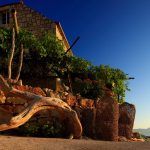August 1, 2018 — Several signs show the green, eco-conscious tourism industry has attracted investors, who see potential in the still-nascent sector.
Imagine a scenic luxury resort, secluded in the Dalmatian foothills next to a manmade lake. In any direction is one of six nature or national parks. All guests have electric cars and bikes at their disposal. Accomodations? Around 70 wood or canvas houses, some built into treetops.
The food: Sourced from nearby family farmers.
Amenities include a conference hall, swimming pool, jacuzzi and sauna.
It costs about 400 to 500 euros per night to stay there.
We initially wrote about it a few days ago, and while it all sounds a bit farfetched in a country struggling to open a standard issue high-end hotel on its premier islands.
Yet former race car driver, luxury tourism guru and entrepreneur Goran Štrok believes the 14 million euros spent on the “T-nest” resort will pay off when it opens next June in Lovinac. If he’s right, it’d be Croatia’s first successful big splash into eco-conscious, or “sustainable” tourism. Some may wonder what took so long.
Decreasing overall tourist capacity while selling a simple lifestyle to the wealthy? The arrangement seemingly maximizes profits by default.
Croatia, with its plethora of natural parks and untouched land, seems ready to cater to a sector of the tourism industry with deep pockets yet fetishizes minimalism, modesty and shuns modernity. Nearly nine percent of the country’s territory is under some sort of environmental protection regulation. The country’s national and nature parks alone have drawn 17,4 million tourists over the last six years, according to the Energy and Environmental Ministry.
Several forces outside of Croatia’s control are helping push the country towards embracing sustainable tourism in a form well beyond its bullet-point addled 2016 action plan.
UNESCO has been pushing to declare the 800.000 hectares of land dubbed “The Amazon of Europe” a biosphere reserve. The land runs along the rivers Mura, Drava and Danube, and is shared by Austria, Slovenia, Hungary, Croatia and Serbia.
The River Mura’s 29.000 hectare chunk was declared a biosphere reserve recently, increasing the potential value of a planned bicycle route running along the stretch of rivers.
The sustainable tourism sector is even drawing from Zagreb’s coffers, which dedicated government funds and EU cash to various eco-conscious projects to Primorska-Goranska county.
T-nest, a nod to Nikola Tesla, is targeting cash-flush guests from all over the world looking for an escape from their urbanized lifestyle, reports Zadarski List. The resort itself will be a short drive from Tesla’s hometown of Smiljan.
The complex would be located within the Velebit Nature Park, with 13 river houses and eight tree houses among the 70 or so on offer. It will also include two restaurants, including a Japanese-Mediterranean fusion eatery on the water.
[Note: Štrok was key to a bribery and organized crime investigation which brought down two members of the alleged “Dubrovnik Mafia,” who served as de facto gatekeepers to the city.]
Could T-nest be the start of something big? Or will meet a fate similar to Croatia’s many other proposed-yet-AWOL luxury tourism plans.








